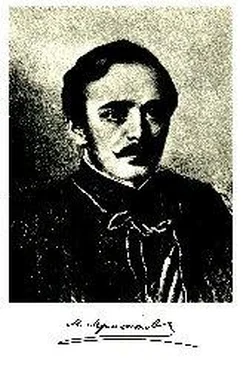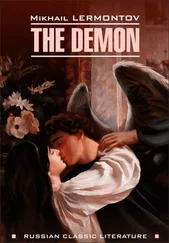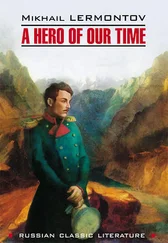pipe. He was wearing an officer's coat without epaulets
[14] epaulets or epaulettes , fancy shoulder boards with fringes hanging from the ends showing an officer's rank. Although mostly generals or admirals wear them now for fancy dress, even lowly officers wore them then regularly.
and a shaggy Circassian
[15] The Chechens, and the Lezgians of Dagestan (the eastern part of the mountains), are Muslims, but speak Indo-European languages. Like many Native American Indians and third-world people in other countries, they bravely resisted the white man's colonization and pacification attempts, with a dirty guerrilla war that lasted years. The Dagestan guerrillas were conquered in 1857-9, when many of them went south to Armenia. The Chechens, many in North Ossetia in the mid part of the Caucasus, were also defeated. In 1920 they formed a province (oblast) under the Russians, united with the Inguish, but were exiled to Central Asia by Stalin after they were charged with collaboration with the Germans during World War II (in 1957 Khrushchev allowed them to return). December 11, 1994, Chechnia was again invaded by Russian troops, who destroyed the capital but failed to completely subdue the mountain guerrillas. We have seen little on the Internet about Ossetia, but here is a record of a visit by Fitzroy Maclean , we don't know when. And this Australian web page contains a full list of links to other resources about the Caucasus region .
cap. He looked about fifty, his tan
[16] older translations use "swarthy" – Nabokov comments that Lermontov uses both cliched and strange words for colors.
face showed a long relationship with the Caucasian sun, and his prematurely gray mustache did not match his firm step and vigorous appearance. I went up to him and bowed. He silently returned my greeting, blowing out an enormous cloud of smoke.
"I guess we're fellow travelers?"
He bowed again, but did not say a word.
"I suppose you're going to Stavropol [17] Russian army headquarters in North Caucasus, 160 miles northwest of Vladikavkaz.
?"
"Yes, sir, I am... with some government baggage."
"Will you please explain to me how it is that four oxen easily manage to pull your heavy carriage while six animals can barely haul my empty one with the help of all these Ossetians?"
He smiled wisely, casting a glance at me as if to size me up.
"I bet you haven't been long in the Caucasus?"
"About a year," I replied.
He smiled again.
"Why do you ask?"
"No particular reason, sir. They're awful good-for-nothings, these Asiatics [18] i.e., not European Russians, who were those to the north but closer to the West. The term used by Maksim Maksimivich – though, is not one of much respect, more like the derogatory slang used by an American soldier, either for enemy or ally or just foreign civilian – just refers usually to the "foreign" Muslims in general.
! you don't think their yelling helps much, do you? You can't tell what the hell they're saying. But the oxen understand them all right. Hitch up twenty of the animals if you want to and they won't budge as soon as those fellows begin yelling in their own language. . . Terrific cheats, they are. But what can you do about them? They do like to skin the traveler. Spoiled, they are, the robbers!... you'll see they'll make you tip them too. I know them by now, they won't fool me!"
"Have you served long in these parts?"
"Yes, ever since General Aleksey Yermolov [19] (1772-1861), greatly respected leader of Russian counter-guerrilla operations, especially in Chechnia and Dagestan, 1818-1827.
was here," he replied, drawing himself up. "when he arrived at the line [20] here, the row of front-line forts in the counter-guerrilla war.
i was a second lieutenant [21] the officers' ranks in this book are significant – it seems that Pechorin was demoted after the duel and before the Bela episode, although he still outranked a cadet as an ensign. A second lieutenant or shtabs-kapitan was below captain but above ensign.
, and under him was promoted twice for service against the guerrillas A Hero of Our Time By Mikhail Lermontov Contents The Author's Preface (to the 2nd edition) Bela Maksim Maksimich Introduction to Pechorin's Journal Taman Princess Mary The Fatalist [Notes]
[22] Parker's word is "ruffians", Nabokov's is "cut-throats." It indicates the resentment of the regular army officer against the unconventional but effective tactics of the mountain guerrillas, a word we sometimes use for Parker's abreks .
."
"And now?"
"Now I'm in the third line battalion. And you, may I ask?"
I told him.
This brought the conversation to an end and we walked along side by side in silence. On top of the mountain we ran into snow. The sun set and night followed day without any interval in between as is usual in the South. Thanks to the glistening snow, however, we could easily pick out the road which still continued to climb, though less steeply than before. I gave orders to put my suitcase in the carriage and replace the oxen with horses, and turned to look back at the valley down below for the last time, but a thick mist that rolled in waves from the gorges blanketed it completely and not a sound reached us from its depths. The Ossetians loudly pestered me, demanding money for vodka. But the captain shouted at them so fiercely that they went away in a second.
"You see what they're like!" he grumbled. "They don't know enough Russian to ask for a piece of bread, but they've learned to beg for tips: 'Officer, give me money for vodka!' Even the Tatars [23] also spelled Tartars, descendents of invaders from Central Asia, but essentially at this point any Muslims who speak Turkish languages. Remember the Circassians don't speak a Turkic dialect, but a rare Indo-European one.
are better-at least, they don't drink alcohol...."
About a mile remained to the stage coach station. It was quiet all around, so quiet that you could trace the flight of a mosquito by its buzz. A deep gorge yawned black to the left. Beyond it and ahead of us the dark blue mountain peaks wrinkled with gorges and gullies and topped by layers of snow loomed against the pale horizon that still retained the last glimmer of twilight. Stars began to twinkle in the dark sky, and, strangely enough, it seemed that they were far higher here than in our northern sky in Russia. On both sides of the road naked black boulders jutted up from the ground, and here and there some shrubs peeped from under the snow. Not a single dead leaf rustled, and it was pleasant to hear in the midst of this lifeless sleepiness of nature the snorting of the tired stage coach horses and the uneven tinkling of the Russian carriage bells.
"Tomorrow will be a fine day," I observed, but the captain did not reply. Instead he pointed to a tall mountain rising directly ahead of us.
"What's that?" I asked.
"Mount Gud."
"Yes?"
"See how it smokes?"
Indeed, Mount Gud was smoking. Light wisps of mist crept along its sides while a black cloud rested on the summit, so black that it stood out as a blotch even against the dark sky.
We could already make out the stage coach station and the roofs of the huts around it, and welcoming lights were dancing ahead when the gusts of cold raw wind came whistling down the gorge and it began to drizzle. Barely had I thrown a felt cape over my shoulders than the snow came. I looked at the captain with respect now...
"We'll have to stay here overnight," he said, annoyed. "You can't get through the hills in a blizzard like this. Seen any avalanches on Cross Mountain?" he asked a coachman.
"No, sir," the Ossetian replied. "But there's a lot just waiting to come down."
Читать дальше

![Михаил Лермонтов - A Hero of Our Time [New Translation]](/books/27671/mihail-lermontov-a-hero-of-our-time-new-translati-thumb.webp)










